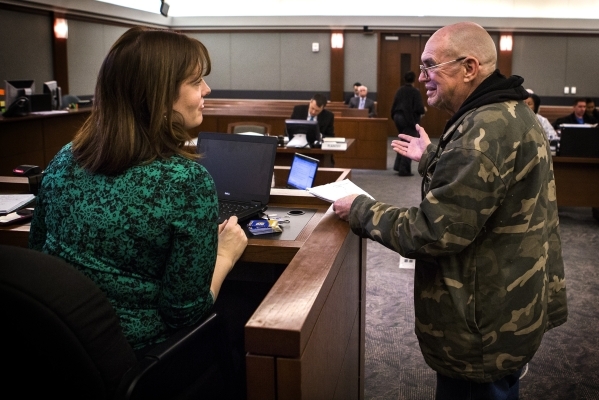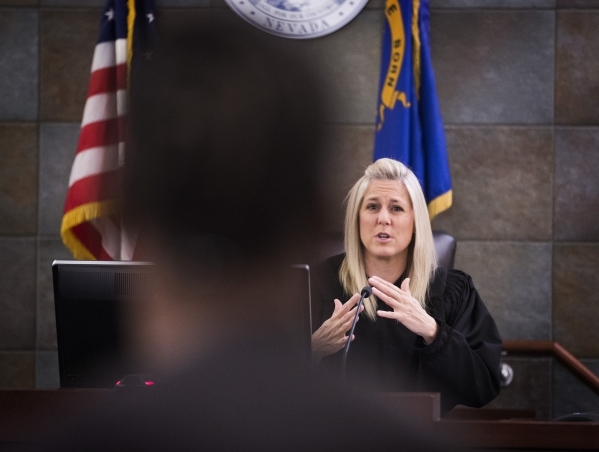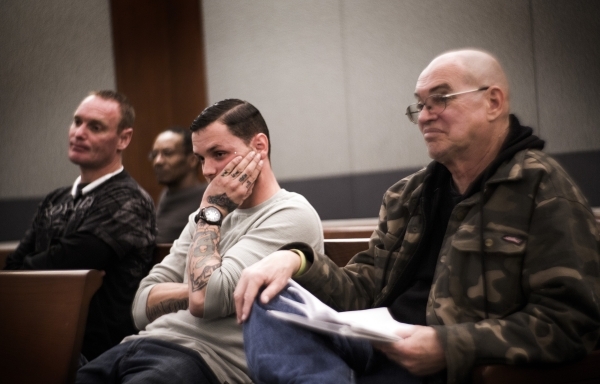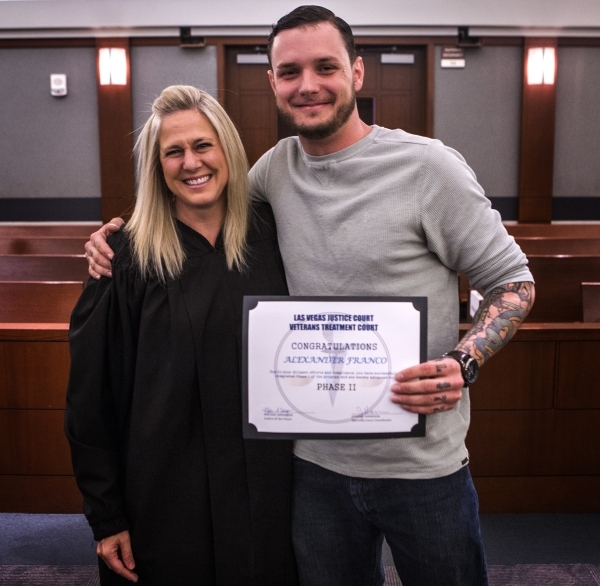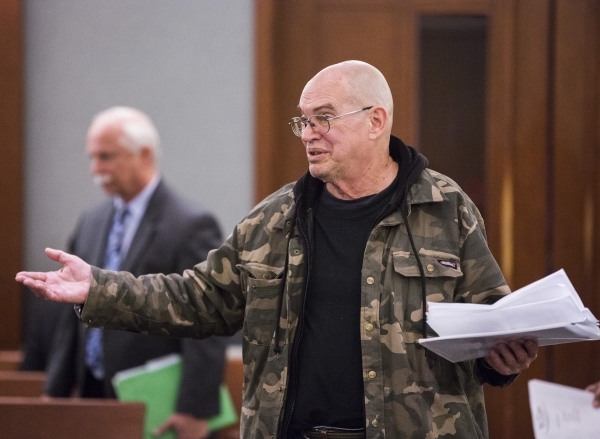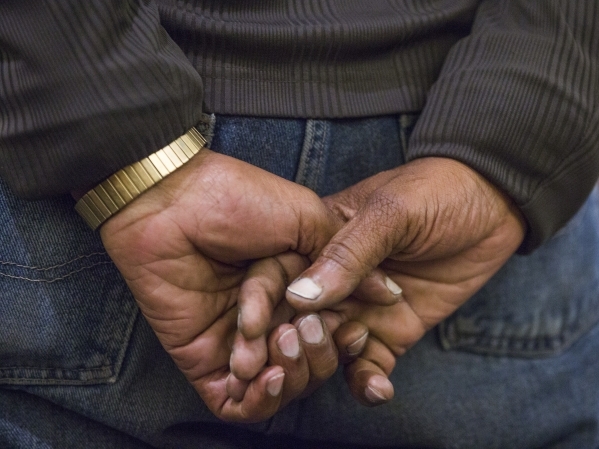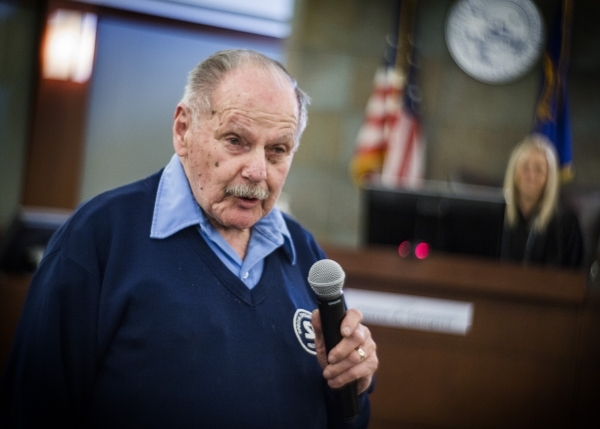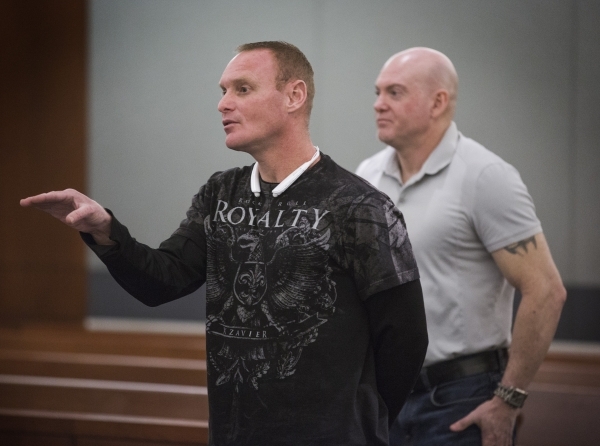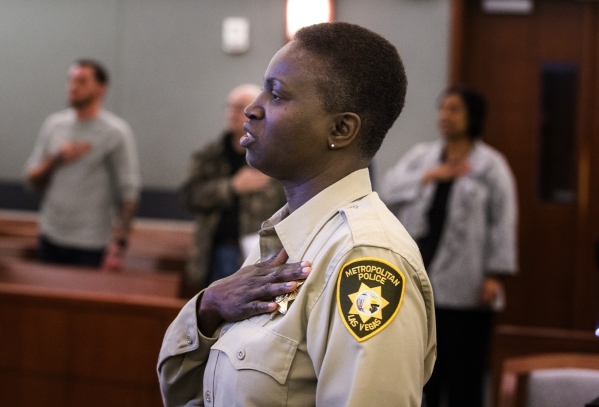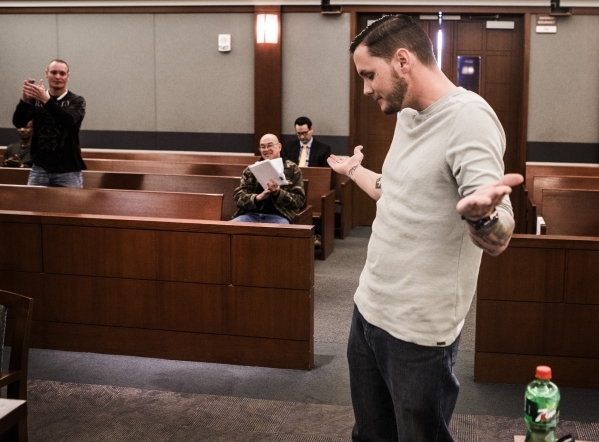Special veterans court gives second chance to those who served
Too often, veterans return from war with memories of unspeakable violence and horror. They've survived the worst that humanity has to offer, and while they may have left the war in another county, a tougher battle is waiting for them at home. For many, returning and adjusting to civilian life is difficult.
The lack of resources and support — along with the push of medication — can take a toll on just about anyone. It becomes easy to fall prey to drugs, violence or other criminal acts.
The Veterans Treatment Court was created in Clark County as an alternative program for veterans charged with misdemeanor crimes.
"This program was created to meet the unique needs of veterans," said Judge Melissa Saragosa, who oversees the program. "This is an alternative to incarceration. Historically, we have found that typical sentencing for cases does not help recidivism. I can definitely say that the majority of veterans have coexisting mental health issues, such as post-traumatic stress disorder."
The Veterans Treatment Court is similar to drug and mental health court. It provides an alternative to incarceration that offers treatment, accountability and structure, while connecting the veteran to services and benefits he has earned.
Veterans who participate in the yearlong program must commit to multiple appointments each week.
After the U.S. Department of Veterans Affairs does an assessment and determines what the veteran's needs are, the program is morphed around that specific treatment.
A case management team consisting of the deputy district attorney, public defender deputy, judge, out court coordinator and veteran justice outreach liaison work together to help the veteran.
In addition, fellow veterans volunteer their time to become a mentor for participants in the program.
"Having a fellow veteran as a mentor gives the participants a level of confidence and trust," Saragosa said. "Just like they helped each other through battle, these guys will help our veterans get back to a stable life. We are always in need of veteran mentors."
The court specializes in helping troubled veterans through various treatments, such as counseling, and linking them to government benefits, including medical, housing, financial, vocational and employment assistance.
Participants of the program receive incentives, such as awards, praise and gift cards, to encourage them to continue.
Similarly, participants who mistreat the program face consequences, such as incarceration or community service, and may be reprimanded by the judge. In cases of continuous noncompliance, a veteran may be removed from the program.
Participants are regularly tested for drugs and alcohol.
An enticement of Veterans Treatment Court is that those who agree to go through the program have an opportunity to get their charges reduced, avoid incarceration or get their case dismissed.
The program was started in Clark County in 2014, and while it is fairly new, Saragosa said the nationwide program has seen a lesser rate of re-offense, and the cities that participate in the program have saved money that would otherwise be spent on jails.
According to the Vera Institute of Justice, a nonprofit that works closely with the government to improve services that people rely on for safety and justice, a 2012 study found the aggregate cost of prisons in 2010 in the 40 states (including Nevada) that participated was $39 billion. The annual average taxpayer cost in these states was $31,286 per inmate.
Since then, Saragosa said the program has had 19 graduates and one re-offense.
"We have not yet implemented all evidence-based practices, but we're bringing our court to national standards," she said. "The program has grown by leaps and bounds in infrastructure in the last two years."
The success of the Clark County program is also partly due to Saragosa herself, who brings a unique perspective to the bench.
In March 1994, she was selected as a direct appointee to the United States Air Force Judge Advocate General's Corps. Her first active duty assignment was at Luke Air Force Base, Ariz., where she worked in various positions including chief of legal assistance and preventive law, chief of administrative law, claims officer and chief of labor law.
She served as the lead prosecutor on court-martial cases at 18 bases in the western region of the U.S.
After two years prosecuting cases on the Western Circuit at Travis Air Force Base, Calif., Saragosa separated from active duty and joined the Air Force Reserve Corps in 1999.
"The majority of people involved in this program are vets. I'm a vet, and while I may not have been through combat, I understand what they've been through," she said. "There's a great level of respect there because of this. Many veterans are used to this military chain of command or structure. I think they see me fill that role for them. They're very receptive to that."
More than half of the 2.6 million veterans deployed to Iraq and Afghanistan return with mental health conditions related to their service, according to a recent Veterans Treatment Court program press release. In addition, one in six struggle with addiction, and one in five have PTSD.
Aaron Araiza, 29, graduated from the program Jan. 8.
He enlisted in Marine Corps boot camp when he was 17 and received an automatic promotion to Private First Class due to his Eagle Scout achievement.
He was deployed to different countries, including Iraq, where he survived two explosions, which were each 30 minutes apart.
Araiza walked away with a traumatic brain injury, a concussion, a blown eardrum, a fractured tail bone and right shoulder, and lower back pain.
He was awarded a Purple Heart and said he feels lucky to have survived, but things changed quickly once he arrived home.
"With my PTSD and with the pain that I was dealing with, I started doing a lot of self-medicating and drinking," Araiza said. "I never went to the VA ... Eventually, my anger got the best of me, and I was arrested in November 2014 for domestic violence."
He was accepted into the program in January 2015. Today, he lives independently, has a full-time job and is about to receive his bachelor's degree in technical management from DeVry University.
"This program is not easy, and not everyone who qualifies for the program is ready to personally attack their issues," Saragosa said.
For veterans such as Araiza, the program is a life-changer.
"We're all human, and we're based off of our natural survival instincts," Araiza said. "In the military, they sharpen and harden those survival instincts. Civilians never develop those skills, so they stay more rational than us. When we see a small problem or incident, we flip the switch. After all, we were trained to save lives or take lives, and we have the strength and power to do that, and we do it well. When we come home, they don't retrain us to become civilians. By the time we end up in court, we're broken. You can't fix it unless it's broken."
Veterans who are interested in the program are encouraged to talk to their attorney about it. Space is available.
Veterans court sessions are scheduled for 10 a.m. every other Friday at the Las Vegas Justice Court Dept. 4, Courtroom 7D.
"I haven't been this happy and this great in life since the day I joined the Marine Corps when I was a 17-year-old, clean-and-sober kid who was extremely focused and had the world ahead of me," Araiza said. "I served my country, I fought in the war, I got a little messed up and fell down a couple of times, but this great American government has given us a second chance — literally, a second chance."
— To reach North View reporter Sandy Lopez, email slopez@viewnews.com or call 702-383-4686. Find her on Twitter: @JournalismSandy
Veterans Treatment Court
Veterans who are interested in the program are encouraged to talk to their attorney about it.
Space is available. Sessions are scheduled for 10 a.m. every other Friday at the Las Vegas Justice Court Dept. 4, Courtroom 7D.



